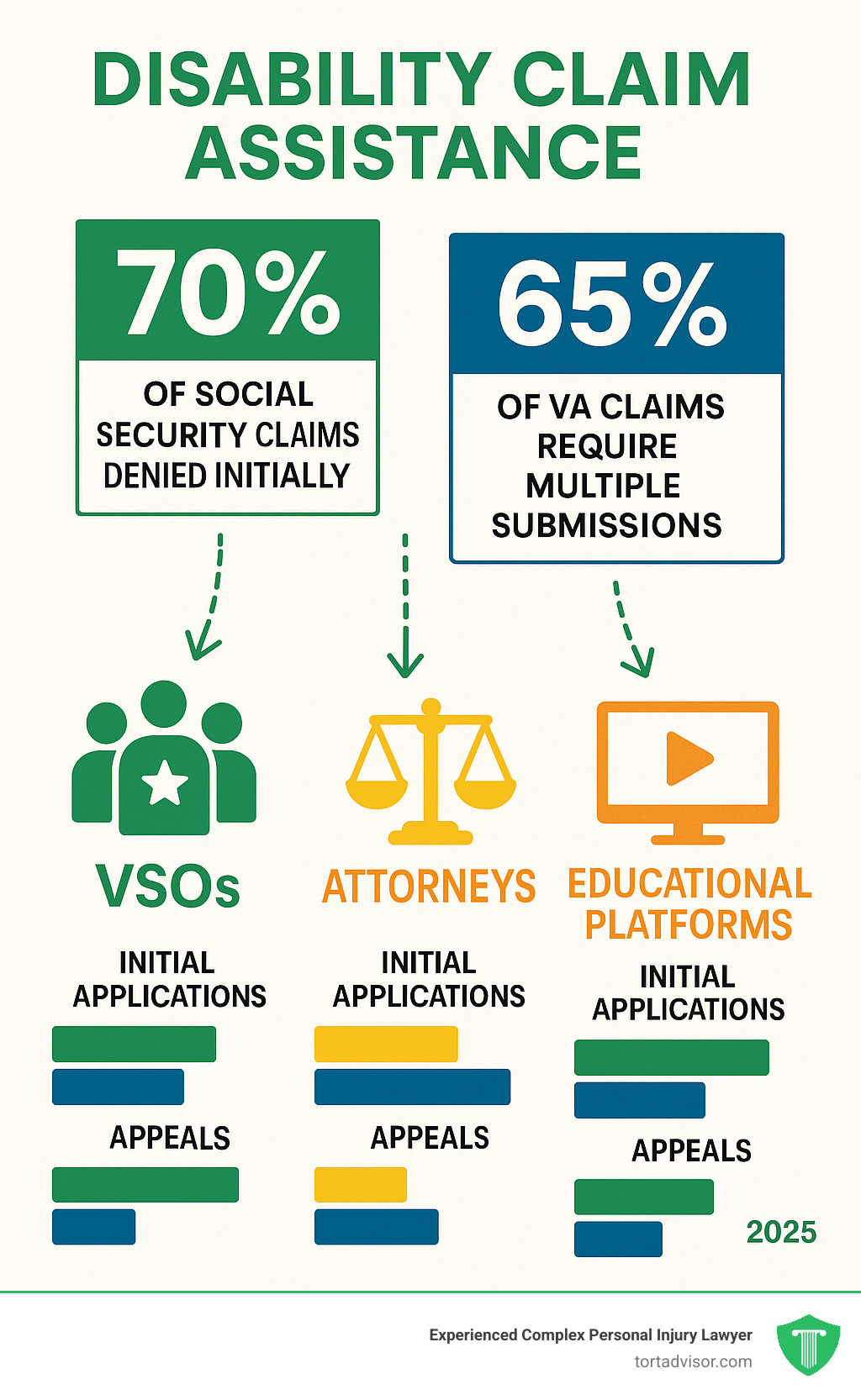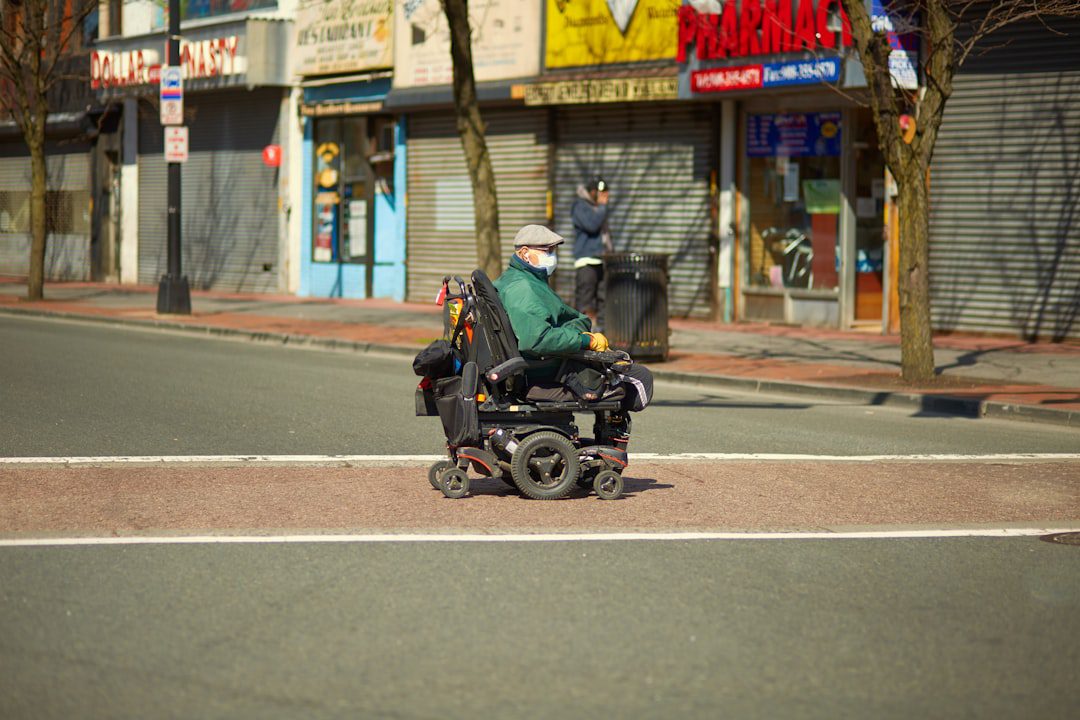


Why Disability Claim Assistance Makes the Difference
Disability claim assistance provides crucial support for navigating the complex process of securing benefits when injury or illness prevents you from working. Whether you’re applying for Social Security Disability (SSDI), Supplemental Security Income (SSI), or VA disability compensation, professional guidance can significantly improve your chances of approval.
Quick Answer – Your Disability Claim Assistance Options:
- Veterans Service Organizations (VSOs) – Free help from DAV, VFW, Wounded Warrior Project
- Accredited Attorneys – Legal expertise for complex cases and appeals (work on contingency)
- Educational Platforms – Self-advocacy training and peer support communities
- Claims Consultants – Professional guidance through the application process
The statistics are sobering. Approximately 70% of initial disability claims are denied by the Social Security Administration, while many veterans struggle with the complexities of the VA system. As one veteran shared after receiving assistance: “They took care of me, and now we’re doing okay. Thank God that I went to Morgan & Morgan.”
The good news? You don’t have to face this overwhelming process alone.
The reality is stark – most people don’t understand the intricate requirements, medical evidence standards, or procedural deadlines that can make or break their claim. Filing without proper guidance often means leaving money on the table or facing unnecessary denials.
But here’s what many don’t realize: Different types of assistance work better for different situations. VSOs excel at initial applications, attorneys shine during appeals, and educational platforms empower you to advocate effectively for yourself.
I’m Mason Arnao, and through my experience building technology systems that process millions of database transactions daily, I’ve seen how complex administrative processes can overwhelm individuals seeking disability claim assistance. My background in systems administration and data management has given me unique insights into navigating bureaucratic procedures efficiently.
Understanding the Different Types of Disability Benefits
Navigating disability benefits can feel like learning a foreign language, but here’s the good news: there are really just two main systems you need to understand in the United States. The Social Security Administration handles civilian disability benefits, while the Department of Veterans Affairs takes care of our veterans.
The key difference? Social Security programs focus on your ability to work and your financial need, while VA benefits center on whether your disability connects to your military service. Think of Social Security as asking “Can you work?” and the VA as asking “Did your service cause this?”
Understanding which system applies to your situation is crucial for getting the right disability claim assistance and avoiding months of delays.
Social Security Disability Insurance (SSDI)
SSDI works like an insurance policy you’ve been paying into with every paycheck. Remember those Social Security taxes coming out of your pay? That’s your investment in this safety net.
To qualify, you need enough “work credits” – basically proof that you’ve worked and paid Social Security taxes recently enough and long enough. The younger you are, the fewer credits you need. A 31-year-old might need just six credits, while someone over 62 needs up to 40 credits.
Once approved, there’s a five-month waiting period before payments start. It’s frustrating, but there’s one exception: if you have ALS (Lou Gehrig’s disease) and were approved after July 23, 2020, you skip the wait entirely.
Here’s something many people don’t realize: your family might qualify too. Your spouse, children, or even divorced spouse could receive benefits when you start getting SSDI. This can add significant money to your monthly support.
For a detailed comparison of how SSDI differs from other programs, check out the SSA’s guide: Learn more about and compare SSDI and SSI benefits.
If your claim runs into legal trouble, you’ll want to know about SSDI Lawsuits and your options.
Supplemental Security Income (SSI)
SSI is completely different from SSDI – and that’s actually great news for many people. You don’t need any work history at all. Zero. None.
This needs-based program helps people who are 65 or older, blind, or disabled, and who have very limited income and resources. The income limits are strict, but if you qualify, SSI can provide crucial support even if you’ve never worked a day in your life.
Can you get both SSDI and SSI? Absolutely. It’s called “concurrent benefits,” and it happens when your SSDI payment is low enough that you still qualify for SSI’s income limits.
Unlike SSDI’s waiting period, SSI pays from your first full month after filing or becoming eligible – whichever comes later.
Want to see if you might qualify? The Social Security Administration offers a helpful tool: Use the Social Security benefits questionnaire
VA Disability Compensation
For veterans, VA disability compensation is a monthly, tax-free benefit – and that tax-free part makes a huge difference in your actual take-home amount.
The catch? Your disability must be “service-connected,” meaning it happened during your military service or got worse because of your service. The VA assigns you a disability rating from 0% to 100% based on how severely your condition affects your daily life.
Here’s where it gets tricky: if you have multiple conditions, the VA doesn’t just add them up. They use something called a “combined ratings table.” So a veteran with a 50% brain injury rating and a 50% back injury might end up with an 80% combined rating, not 100%. The math is weird, but there’s a reason – the VA calculates based on your remaining “efficiency” after each condition.
Recent changes have opened new doors. The PACT Act expanded benefits for veterans exposed to toxic substances, creating opportunities for claims that might not have qualified before.
The claims process can be overwhelming, which is why disability claim assistance becomes so valuable for veterans. The Wounded Warrior Project offers excellent guidance on Filing for a VA Disability Claim to help you get started.
Navigating the Types of Disability Claim Assistance
When you’re facing a disability claim, choosing the right help can feel overwhelming. It’s like standing in front of a toolbox when you need to fix something – each tool has its purpose, but which one will actually get the job done?
The truth is, disability claim assistance comes in different forms, and what works perfectly for your neighbor might not be the best fit for you. Some options are completely free, others charge fees, and each has different levels of expertise and involvement. Understanding these differences upfront can save you time, money, and a lot of frustration down the road.
The key is matching your specific situation with the right type of help. Are you filing your first claim and need someone to walk you through the basics? Or have you been denied multiple times and need serious legal firepower? Maybe you’re the type of person who wants to understand every detail and take control of your own case.
Veterans Service Organizations (VSOs)
If you’re a veteran looking for disability claim assistance, Veterans Service Organizations are often your first and best stop. Organizations like Disabled American Veterans (DAV), Veterans of Foreign Wars (VFW), and Wounded Warrior Project offer something pretty amazing – completely free help from accredited representatives who know the VA system inside and out.
These folks have seen it all. They’ll help you file initial claims, gather the right medical evidence, and decode those confusing VA decision letters that seem written in a foreign language. The best part? It won’t cost you a penny.
But here’s where it gets real. VSOs handle thousands of veterans, which sometimes means your case might get the cookie-cutter approach. They’re great at getting basic claims filed correctly, but they might miss those unique details that could bump your rating from 70% to 100%. Also, getting an appointment can take weeks or even months in busy areas.
There’s another thing to watch out for – not everyone offering “free” help is legitimate. As Wounded Warrior Project warns, some predatory companies prey on veterans with promises that sound too good to be true. If someone guarantees you’ll get 100% disability or asks for money upfront, run the other way. You can read more about these red flags here: WWP Warns Veterans of Predatory Claims Assistance Practices.
Accredited Attorneys and Claims Agents
When your case gets complicated – and trust me, they often do – accredited attorneys and claims agents bring serious legal expertise to the table. These professionals live and breathe disability law, and they know exactly how to present your case to maximize your benefits.
Here’s how the money works: attorneys typically work on contingency, meaning they only get paid if you win. For Social Security cases, they usually take about 25% of your back pay, capped at around $6,000. For VA claims, attorneys can only charge fees during the appeals process, not for initial applications. This setup is actually pretty fair – their success depends entirely on your success.
Attorneys really shine during complex cases and appeals. If you’ve been denied multiple times, have several medical conditions, or your case involves tricky legal arguments, having a lawyer can make the difference between getting benefits and getting another denial letter. They know which medical evidence carries the most weight and how to present your case in the strongest possible light.
If you’re wondering whether legal help is right for your situation, our guide on Do I need a Personal Injury Lawyer? covers many of the same considerations that apply to disability cases.
Educational Platforms and Peer Support
There’s a growing movement toward self-advocacy in the disability world, and it’s pretty empowering. Educational platforms and peer support communities teach you to become your own expert rather than relying on someone else to handle everything.
These platforms offer courses, templates, and step-by-step guidance to help you understand the system, gather compelling evidence, and present your case effectively. Instead of hoping someone else gets it right, you learn to “speak VA” or “speak SSA” yourself.
The peer support aspect is incredibly valuable. Online communities connect you with others who’ve walked the same path. They offer emotional support when you’re frustrated with another denial, and tactical advice from people who’ve actually been through the process. Sometimes a fellow veteran who got their PTSD claim approved can give you insights that even the best VSO representative might miss.
The biggest advantage? Long-term empowerment. Once you understand the system, you’re equipped to handle future claims, help other veterans, and never feel lost in the bureaucracy again.
Comparing Your Assistance Options
Here’s how your main disability claim assistance options stack up:
| Feature | VSOs | Attorneys | Educational Platforms |
|---|---|---|---|
| Cost | Free | Contingency fee (25% if you win) | Varies (subscription or one-time fee) |
| Your Involvement | Low – they handle everything | Medium – you provide info, they handle legal work | High – you learn and do the work |
| Best for Initial Claims | Excellent (free and effective for straightforward cases) | Good (but expensive for simple cases) | Excellent (empowers you to file correctly) |
| Best for Appeals | Good (can file appeals but may lack specialized expertise) | Excellent (legal expertise crucial for appeals) | Good (teaches appeal strategy) |
| Success Rates | Solid for standard claims | Higher for complex cases | Depends on how well you apply what you learn |
The right choice depends on your specific situation, how comfortable you are advocating for yourself, and whether your case is straightforward or complicated. Many people actually use a combination – starting with education, trying a VSO for initial filing, and bringing in an attorney if appeals become necessary.
The Claims Process: Key Stages Where Help Matters
Think of filing a disability claim like building a house – you need a solid foundation, proper tools, and someone who knows the building codes. Without the right guidance, even the strongest case can crumble. This is where quality disability claim assistance becomes your blueprint for success.
The journey from application to decision can take months or even years, with claim processing times varying widely depending on your location and case complexity. Having someone in your corner who understands the system can mean the difference between approval and denial.
Gathering Essential Evidence for Your Claim
Your evidence is the heart of your disability claim. Without strong documentation, even the most severe disabilities can be denied – it’s that simple.
For Social Security claims, you’ll need comprehensive medical records that paint a complete picture of your condition. This means diagnostic reports, treatment notes, lab results, and imaging studies. But here’s what many people miss: you also need detailed statements from your doctors explaining exactly how your condition limits your ability to work.
For VA claims, the evidence requirements are different but equally important. Your DD214 service record is essential, along with any medical records from your military service. The golden ticket here is often a “nexus letter” – a statement from a medical professional connecting your current condition to your military service.
Don’t overlook buddy letters either. These lay statements from family, friends, or fellow service members can provide powerful testimony about how your disability affects your daily life. Sometimes the most compelling evidence comes from someone who sees you struggle every day.
Getting organized early makes a huge difference. Professional disability claim assistance can help you identify exactly what evidence you need and how to present it effectively. As they say, you only get one chance to make a first impression. Understanding What’s the first step to filing a claim? can set you on the right path from day one.
Preparing for a C&P or Medical Exam
If you’re a veteran, you’ll likely face a Compensation & Pension (C&P) exam. Social Security applicants might need to attend a consultative examination. These aren’t regular doctor visits – they’re evaluations that can make or break your claim.
Here’s the thing: these examiners aren’t there to treat you. They’re there to assess your disability level. This means you need to communicate differently than you would with your regular doctor.
Be honest about your worst days, not just how you feel when you’re having a good day. If walking to the mailbox leaves you exhausted and in pain, say so. If you need help getting dressed some mornings, don’t be embarrassed to mention it.
Stay consistent with what you’ve told your treating doctors and what’s in your medical records. Contradictions can sink your claim faster than anything else. Bring a list of your medications and be prepared to describe exactly how your condition affects your ability to work or perform daily activities.
Many veterans find the C&P exam intimidating, but preparation can ease those nerves. The Wounded Warrior Project offers excellent guidance on Preparing for a C&P Exam that can help you feel more confident going in.
What to Do If Your Claim is Denied: The Appeals Process
Getting that denial letter feels like a punch to the gut. But here’s what you need to know: denial is not the end of your story. With those 70% initial denial rates we mentioned earlier, you’re definitely not alone.
The appeals process is where having professional disability claim assistance really pays off. These systems are complex, and knowing which path to take can save you months or even years.
For Social Security appeals, you have several options. Reconsideration means someone new reviews your file – this works sometimes, but not often. The real opportunity usually comes at the hearing stage, where you can appear before an Administrative Law Judge and present your case in person. This is where many claims finally get approved.
For VA appeals, you have three main paths. A Supplemental Claim lets you submit new evidence you didn’t have before. A Higher-Level Review asks a senior reviewer to take a fresh look at what’s already there. A Board Appeal takes your case to a Veterans Law Judge for a formal review.
The key is choosing the right appeal path for your specific situation. Submit new evidence when you have it, but don’t waste time on a Supplemental Claim if your evidence is already strong. Professional guidance can help you make this crucial decision.
You can Learn how you can appeal directly from the SSA’s website. For those facing more complex legal challenges with their claims, we also have More info about SSDI Lawsuits available.
The appeals process is often where persistence pays off. Don’t let that initial denial discourage you from fighting for the benefits you’ve earned.
Frequently Asked Questions about Disability Claim Help
Let’s be honest – you probably have a lot of questions swirling around in your head about getting help with your disability claim. That’s completely normal! The whole process can feel overwhelming, and you want to make sure you’re making the right choices. Let me walk you through the most common concerns people have about disability claim assistance.
How much does disability claim assistance cost?
Here’s the good news: you have options that fit different budgets, and some won’t cost you a penny upfront.
Veterans Service Organizations are completely free. Organizations like DAV, VFW, and Wounded Warrior Project don’t charge veterans anything for their services. They’re funded through donations and grants specifically to help veterans like you steer the system.
Attorneys work differently depending on your type of claim. For Social Security Disability cases, they work on what’s called a contingency fee basis. This means they only get paid if you win – no win, no fee. When you do win, they typically take 25% of your back pay, but it’s capped at $6,000 maximum. You won’t pay anything out of pocket to get started.
For VA claims, it’s a bit different. Attorneys can’t charge you for help with initial applications – that’s the law. They can only charge for appeals, and again, it’s usually on a contingency basis. If you’re curious about how legal fees work in general, you might find our guide on How much does a Personal Injury Lawyer cost? helpful.
Educational platforms vary widely. Some offer free resources and community support, while others charge a one-time fee for comprehensive courses or ongoing access to templates and guidance. Think of it as investing in your own knowledge and ability to advocate for yourself.
The key is understanding exactly what you’ll pay before you commit to any service. Don’t be afraid to ask direct questions about costs upfront.
How do I know if a representative is accredited?
This is such an important question, and I’m glad you’re asking it. Unfortunately, there are people out there who prey on folks seeking disability claim assistance – we call them “claim sharks.”
For VA claims, verification is straightforward. The VA maintains a searchable database of everyone who’s accredited to represent veterans. This includes attorneys, claims agents, and VSO representatives. Always ask for their accreditation number and double-check it yourself through the official VA database. Don’t just take their word for it.
For Social Security claims, it’s a bit more complex. There isn’t one central database like the VA has, but attorneys must be licensed by their state bar association, and non-attorney representatives need SSA approval. Look for professionals with solid reviews, clear communication about their process, and a proven track record.
Here’s what to watch out for: anyone asking for large upfront payments, making unrealistic promises, or being vague about their credentials. Reputation and transparency should be your guideposts. A legitimate representative will be happy to provide their credentials and explain their process clearly.
Can someone guarantee my claim will be approved?
Absolutely not – and if someone tells you they can, run! This is one of the biggest red flags in the disability claim assistance world. Anyone promising a guaranteed approval is either lying to you or doesn’t understand how the system works.
Here’s the reality: your claim’s success depends on many factors that no representative can control. The strength of your medical evidence, the specifics of your condition, your work history, and how well your case aligns with the strict criteria set by the Social Security Administration or Department of Veterans Affairs all play a role.
What good assistance can do is significantly improve your chances. They can help you gather the right evidence, present your case effectively, avoid common mistakes, and steer the appeals process if needed. But the final decision always rests with the government agencies reviewing your claim.
Be especially wary of services that sound too good to be true – they usually are. Legitimate representatives will be honest about the challenges and realistic about your chances while still working hard to give you the best possible outcome.
The bottom line? Quality disability claim assistance increases your odds of success, but anyone promising guarantees is waving a big red flag that you should avoid.
Conclusion: Taking the Next Step with Confidence
The journey to securing disability benefits doesn’t have to feel like climbing Mount Everest in flip-flops. Yes, it’s challenging, and yes, the paperwork can feel overwhelming. But here’s what I want you to remember: you’re not alone in this fight.
Throughout this guide, we’ve walked through your disability claim assistance options. Veterans Service Organizations offer that invaluable free support that’s perfect for getting started. Accredited attorneys bring the legal firepower you need when things get complicated or when appeals become necessary. Educational platforms give you the tools to become your own best advocate.
The beauty is that there’s no one-size-fits-all solution. Your neighbor might thrive with VSO support, while you might need an attorney’s expertise for a complex appeal. Someone else might find empowerment through self-advocacy training. What matters is finding your right fit.
Remember those sobering statistics we talked about at the beginning? That 70% initial denial rate doesn’t have to be your story. With the right guidance and support, you can steer this system successfully. Every day, people just like you are getting the benefits they deserve – and you can too.
The path forward starts with a single step. Maybe that’s calling a VSO tomorrow morning. Maybe it’s scheduling a consultation with an attorney. Or perhaps it’s enrolling in a course that teaches you to speak the language of disability claims.
At Tort Advisor, we’ve seen how the right legal partnership can transform someone’s life. We connect clients with top-rated specialty attorneys who don’t just understand the law – they understand what you’re going through. These aren’t just legal professionals; they’re advocates who fight for people facing their toughest moments.
Your disability claim isn’t just paperwork. It’s your financial security, your peace of mind, and your ability to focus on what matters most – your health and your family.
Take that next step with confidence. You’ve already started by educating yourself. Now it’s time to act.
Find trusted legal help for your SSDI lawsuit.
Free Confidential Case Evaluation
Complete the short form below to get an immediate FREE case review with an expert in your specific claim. Don't wait, your case could be time sensitive to file a claim.
Related Posts
Discover New Jersey disability benefits: TDI, FLI, SSDI, SSI rates, eligibility, applications & appeals for 2025-2026.
Hire a Depo-Provera lawsuit attorney now. Fight Pfizer for meningioma risks from injections. Free consult, MDL updates & settlements up to $1.5M.
Find top Miami florida car accident lawyers after your 305 crash. Get max compensation, navigate no-fault laws & choose the best experts now!
Diagnosed with cancer after Roundup? Learn about the monsanto roundup lawsuits, eligibility criteria, and how to pursue your claim.
Discover how do you qualify for a hair relaxer lawsuit: criteria, diagnoses, evidence & brands in uterine cancer MDL. Claim review now!
Find the best uber sexual assault lawsuit lawyer: expert guides, MDL experience, proven results & nationwide firms for justice.










